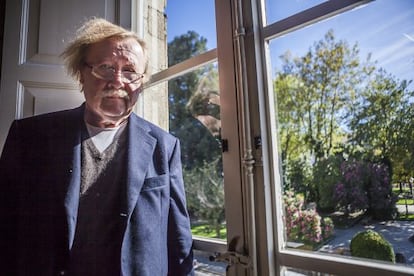Peter Sloterdijk: “The old demons are back in Europe”
The German thinker’s fame as a provocateur has not waned since he published a defense of human genetic manipulation 15 years ago


In the beginning, there was rage. "Of Peleus' son, Achilles, sing, oh Muse, the vengeance deep and deadly," reads the opening verse of The Iliad, which Peter Sloterdijk equates with "Europe's first word." Rage and indignation have been a cornerstone of the continent, and indeed of the entire Western world. A historical analysis of the political consequences of this human energy resulted in a book by Sloterdijk, one of the most controversial of contemporary German thinkers and probably the most influential after Jürgen Habermas.
Sloterdijk was in Santiago de Compostela for two days this week to accept an award for that study, Rage and Time. The prize, named after the great Portuguese-Jewish philosopher Bento Spinoza, is handed out by the local high school Rosalía de Castro, whose students (along with those of four other public schools) voted the text Best Essay.
"For once, I haven't been rewarded by a gerontocratic jury," joked the 66-year-old thinker in a tone of both irony and surprise.
A popular figure in Germany, where he often features on television discussing everything from soccer matches to how to quit smoking, Sloterdijk's ability to stir up controversy wherever he goes is near legendary. After achieving notable success with his 1983 Critique of Cynical Reason , in 1999 he attracted accusations of Nazism, even from Habermas himself, for his essay Rules for the Human Zoo, which advocated the use of genetic techniques to improve humankind and reminded many readers of the Nazis' eugenic policies.
It won't do to slaughter two millionaires and divide the spoils"
Then, three years ago, he published an article in the Frankfurter Allgemeine Zeitung attacking the "fiscal kleptocracy" of Europe's welfare states and proposing that taxes be replaced with voluntary donations. Rage and Time contains a furious attack against what he calls "the fascist left," leading the communist philosopher Slavoj Zizek to hit back with a definition of Sloterdijk as "a liberal-conservative who acts like the enfant terrible of contemporary German thought."
The left, Sloterdijk posits, has historically functioned as a mechanism for the "political organization of rage," or to be more precise, as "a rage bank."
"People would deposit their frustrations there, and like a bank, others would manage that capital and return interests in the form of self-esteem for themselves and contempt for their enemies," says Sloterdijk, peering imposingly over his small glasses and looking every inch the enfant terrible he is purported to be.
But Rage and Time was first written in 2006, and since then "the atmosphere has changed a lot in the world," he warns. "Rage, fury, indignation have all gotten stronger. The thing is, there is no longer a world bank of rage. That role has been played by the left since the 19th century, but these days it is no longer able to sustain it. Islamism is just a local rage bank, with no global reach. These days people can stay at home with their rage and keep it under their pillow or their mattress, because there is nobody to take political advantage of it and return interest on it."
His harsh diagnosis of the consequences of political organization of rage, from Mikhail Bakunin's early anarchism to Stalinism or Maoism, does not mean Sloterdijk belittles the role of indignation in the history of the West. He says as much when he talks about the 15-M movement in Spain — a peaceful grassroots protest against political and economic mismanagement that spawned other global movements such as Occupy Wall Street in the US.
Specialists warned back in the day that the euro could blow up"
"This is nothing new, although the way in which it manifested itself is," he notes. "The Republic is the daughter of rage. She gave birth to the first democratic movement in ancient Rome, where monarchy gave way to the Republic out of popular indignation over the rape of Lucretia by the king's son. The same can be said for the French Revolution. In this sense, young Spaniards proved that they embody authentic democratic tradition."
But this energy cannot be channeled by forces such as "the French left, which acts like a state corporation, exclusively concerned about its civil servants.
"Something completely different is required, a more entrepreneurial instinct. And we need to think that we cannot force the economy. It won't do to slaughter two millionaires and share out their fortunes, handing 20 euros to every person out of a job. I don't think that's a political solution."
The dispute between the north and south of Europe as a result of the economic crisis has opened up a rift whose dangers are very evident to Sloterdijk: "The old demons are back in Europe. It's not about the old nationalisms anymore; now there's a poisonous economic nationalism. And no doubt this is due to the deficiencies in the political construction of Europe. The euro was above all a political project, and specialists back in the day warned that it could blow up. But politicians went ahead with their plans anyway. And this explosion is what we are witnessing now. There is a regression in transnational sentiment."
Sloterdijk also warned about the division between countries that support economic stability, like Germany, and those that defend "inflationist policies, like the southern states."
"The neonationalist differences arise from mixing politics with those technical problems. If we don't avoid that mix, Europe could go up in the air," he forecasts.
Tu suscripción se está usando en otro dispositivo
¿Quieres añadir otro usuario a tu suscripción?
Si continúas leyendo en este dispositivo, no se podrá leer en el otro.
FlechaTu suscripción se está usando en otro dispositivo y solo puedes acceder a EL PAÍS desde un dispositivo a la vez.
Si quieres compartir tu cuenta, cambia tu suscripción a la modalidad Premium, así podrás añadir otro usuario. Cada uno accederá con su propia cuenta de email, lo que os permitirá personalizar vuestra experiencia en EL PAÍS.
¿Tienes una suscripción de empresa? Accede aquí para contratar más cuentas.
En el caso de no saber quién está usando tu cuenta, te recomendamos cambiar tu contraseña aquí.
Si decides continuar compartiendo tu cuenta, este mensaje se mostrará en tu dispositivo y en el de la otra persona que está usando tu cuenta de forma indefinida, afectando a tu experiencia de lectura. Puedes consultar aquí los términos y condiciones de la suscripción digital.








































